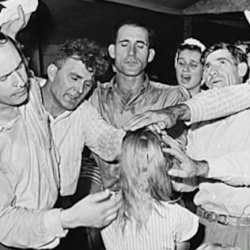“A key function in most religions,” write Michael Emerson and Christian Smith (Divided By Faith) “is to proclaim what ought to be, what is universally true, what is right and just. We call this the prophetic voice” (163).
American religion, however, fragments this prophetic voice, even within the same religion, into thousands of difference voices.” The result, as W.E.B. DuBois said is a “pathetically timid and human” church, one that will “stand on the side of wealth and power” and will “espouse any cause which is sufficiently popular, with eagerness” (162-3).
They offer one example: Does Christianity support or condemn economic inequality? Some Christians cite Christian reasons for Yes; others cite Christian reasons to say No. The two “compete ideologically against each other, fragmenting the religious voice.” If there is an equality of power, the two voices neutralize each other. But power isn’t equal, and so, they argue, “at least in race relations, the dominant white religious voices, amid the vast variety, are nearly always those that are least prophetic, most supportive of the status quo. It is not just that the prophetic voice is fragmented; the prophetic voices that call for overcoming group divisions and inequalities are ghettoized” (163-4).
Competitive pluralism in American religion “encourages religious groups to cater to people’s existing preferences, rather than their ideal callings.” Religious consumers look to congregations not “as an external force that places radical demands on their lives” but to “fulfill their needs.” Since pastors are financially dependent on, and beholden to, congregations that tend to support the status quo, pastors have incentives to restrain their prophetic pronouncements (164-5).
Thus doth denomnationalism make cowards of us all.














